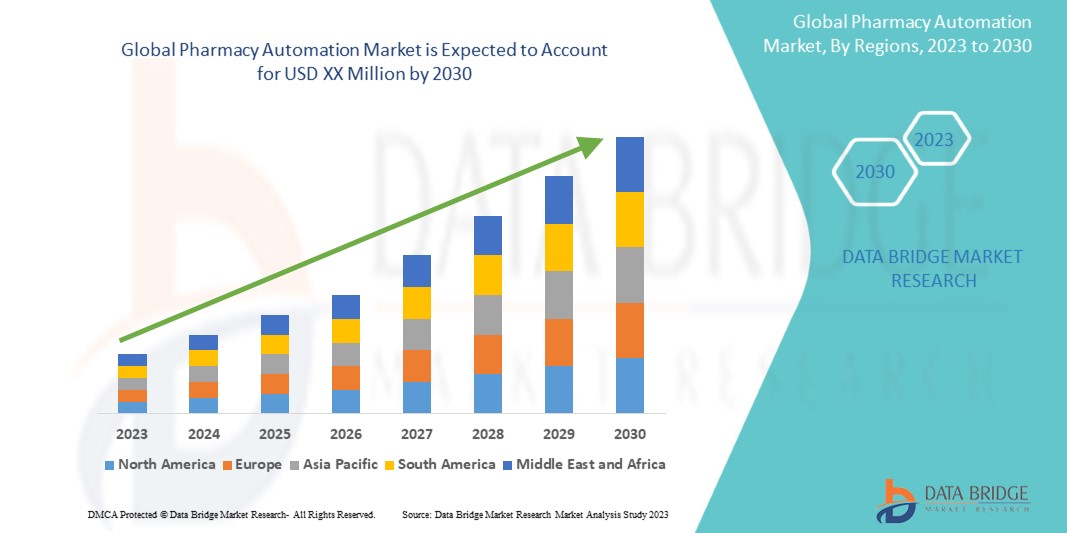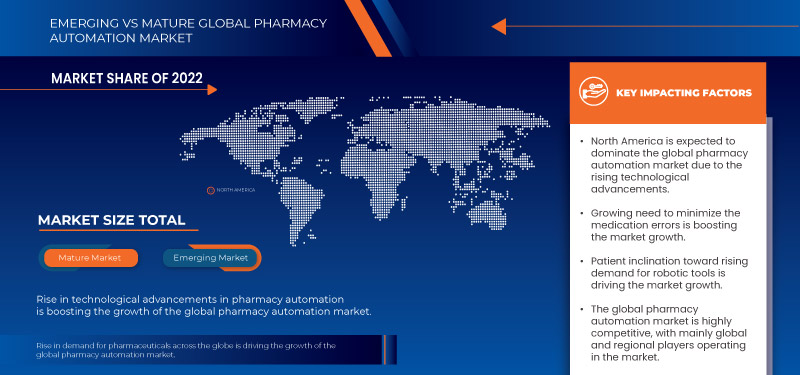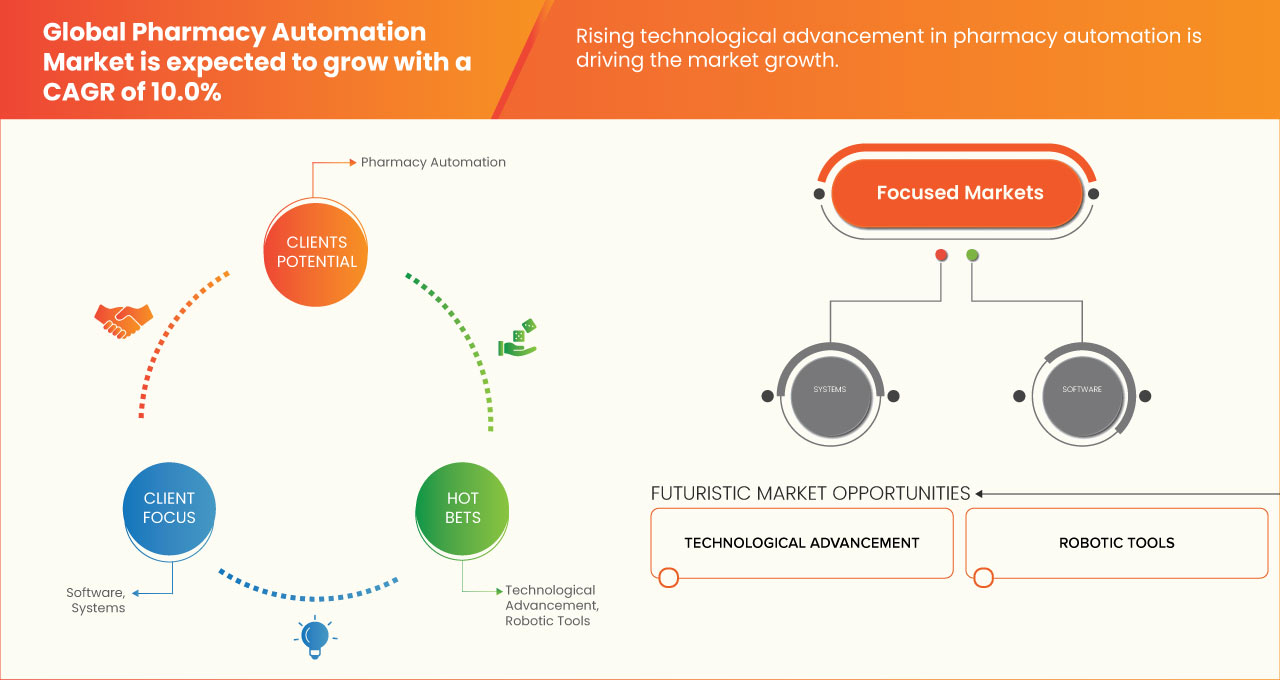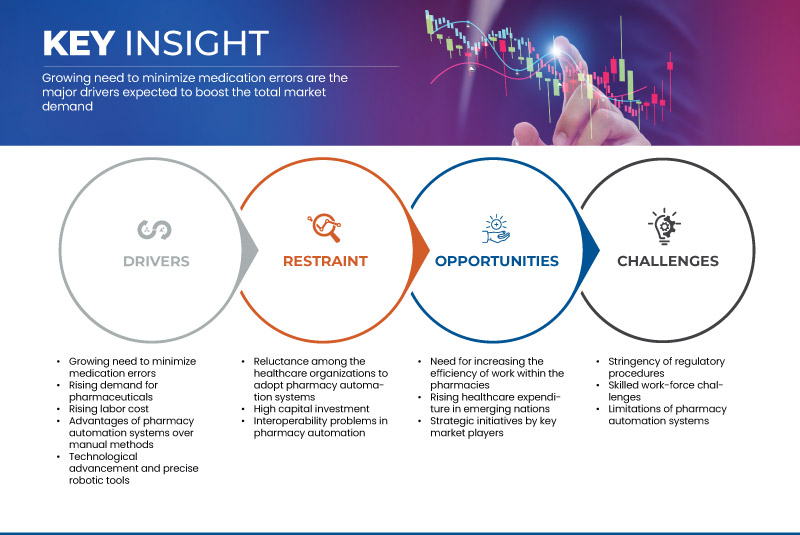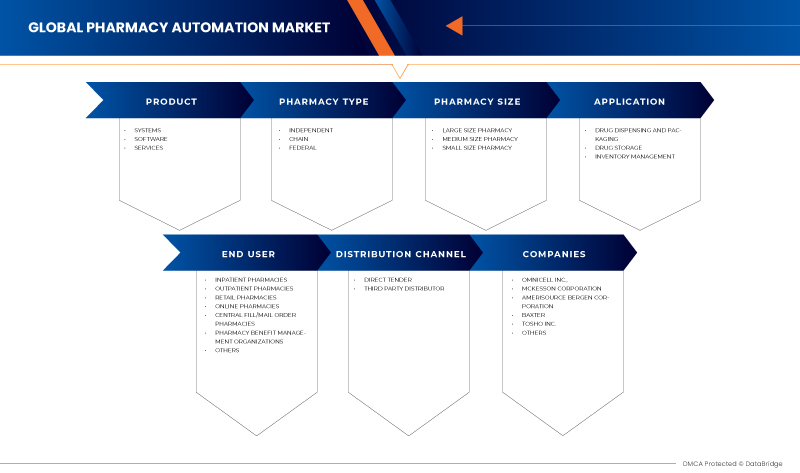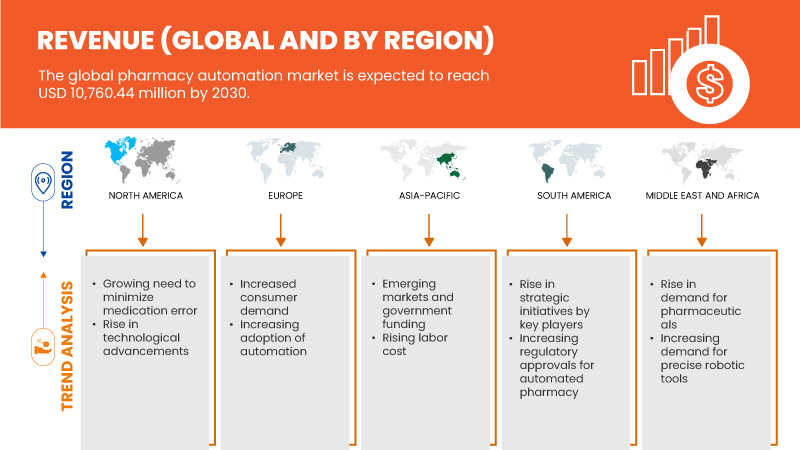Mercado global de automação farmacêutica, por produto (sistemas, software e serviços), tipo de farmácia (independente, rede e federal), dimensão da farmácia (farmácia de grande dimensão, farmácia de média dimensão e farmácia de pequena dimensão), aplicação (dispensação e embalagem de medicamentos) , armazenamento de medicamentos e gestão de stocks), utilizador final (farmácias para doentes internados, farmácias de ambulatório, farmácias de retalho, farmácias online, farmácias centrais de preenchimento/encomenda por correspondência, organizações de gestão de benefícios farmacêuticos e outros), canal de distribuição (concurso direto e distribuidor em outsourcing) - Tendências e previsões da indústria para 2030.
Análise e insights do mercado de automação farmacêutica
A crescente incidência de acidentes e mortes devido a erros de medicação coloca uma enorme pressão sobre o sector geral da saúde. Tanto os profissionais de saúde como os farmacêuticos procuram soluções mais eficazes e precisas para evitar disfunções médicas tão frequentes. Além disso, com o aumento do número de doentes, visitantes e das suas respetivas necessidades de segurança, o sistema de distribuição de medicamentos torna-se mais complicado a cada dia que passa. Para resolver este grave problema, as tecnologias avançadas, como os sistemas de automação farmacêutica, estão agora a emergir como as ferramentas mais poderosas. O objetivo destes instrumentos é reduzir os erros de prescrição médica e maximizar a segurança do doente. Por conseguinte, a implementação de tais sistemas de automação farmacêutica ajuda os prestadores de cuidados de saúde e os farmacêuticos a minimizar as suas perdas e a melhorar a qualidade e a produtividade.
Além disso, a implementação de inovações tecnológicas e o avanço de sistemas automatizados com sistemas de automação farmacêutica melhorados levam a maiores taxas de sucesso e novas aplicações de dispositivos com maior procura de produtos inovadores para medicamentos sujeitos a receita médica para manipulação, dispensa, armazenamento e rotulagem estão a impulsionar o crescimento do mercado durante o período de previsão. No entanto, prevê-se que factores como a relutância na implementação de sistemas de automatização farmacêutica devido ao seu elevado custo restringiriam a sua adopção, o que deverá restringir o crescimento do mercado.
O mercado global de automação farmacêutica é favorável e visa reduzir os erros de dispensa de medicamentos e melhorar a segurança do doente. A Data Bridge Market Research analisa que o mercado global de automação farmacêutica crescerá a um CAGR de 10,0% durante o período de previsão de 2023 a 2030.
|
Métrica de reporte |
Detalhes |
|
Período de previsão |
2023 a 2030 |
|
Ano base |
2022 |
|
Ano histórico |
2021 (personalizável para 2015 - 2020) |
|
Unidades Quantitativas |
Receita em milhões e preços em dólares |
|
Segmentos cobertos |
Produto (Sistemas, Software e Serviços), Tipo de Farmácia (Independente, Rede e Federal), Tamanho da Farmácia (Farmácia de Grande Dimensão, Farmácia de Média Dimensão e Farmácia de Pequena Dimensão), Aplicação (Dispensação e Embalagem de Medicamentos, Armazenamento de Medicamentos e Gestão de Inventário), Utilizador final (Farmácias para doentes internados, Farmácias de ambulatório, Farmácias de retalho, Farmácias online, Farmácias centrais de atendimento/encomenda por correspondência, Organizações de gestão de benefícios farmacêuticos e outros), Canal de distribuição (Concurso direto e Distribuidor terceirizado) |
|
Países abrangidos |
EUA, Canadá, México, Alemanha, França, Itália, Reino Unido, Espanha, Holanda, Rússia, Suíça, Turquia, Bélgica, resto da Europa, Japão, China, Índia, Coreia do Sul, Austrália, Singapura, Malásia, Tailândia, Indonésia , Filipinas , resto da Ásia-Pacífico, Brasil, Argentina, resto da América do Sul, Arábia Saudita, África do Sul, Emirados Árabes Unidos, Israel, Egito e resto do Médio Oriente e África |
|
Participantes do mercado abrangidos |
ARxIUM, OMNICELL INC., Cerner Corporation, Capsa Healthcare, ScriptPro LLC, RxSafe, LLC., MedAvail Technologies, Inc., Asteres Inc., InterLink AI, Inc., BD, Baxter, Fullscript, McKesson Corporation, Innovation Associates, AmerisourceBergen Corporation , UNIVERSAL LOGISTICS HOLDINGS, INC, Takazono Corporation, TOSHO Inc., Willach Group, BIQHS, Synergy Medical, Yuyama, APD Algoritmos Processos y Diseños SA, JVM Europe BV, Genesis Automation LTD, myPak Solutions Pty Ltd., Demodeks Pharmacy Shelving, Deenova Srl, KUKA AG e KLS Pharma Robotics GmbH, entre outros |
Definição de Mercado
A automatização farmacêutica desempenha um papel significativo nos cuidados de saúde modernos, uma vez que permite que os medicamentos sejam convenientemente entregues e distribuídos na farmácia hospitalar ou na farmácia de retalho. A automatização da farmácia ajuda a reduzir o erro na medicação. Evita erros como falta de informação sobre medicamentos, falta de informação do paciente, dispensa de formulações, erros de prescrição, rastreio da terapêutica e outros que possam ocorrer durante o processo manual. Um dos tipos de erros mais comuns são as informações e instruções incorretas na rotulagem. Para melhorar as instalações e os serviços de saúde e garantir a segurança do doente, é vital reduzir os erros de prescrição, razão pela qual o sistema de automatização farmacêutica é utilizado de formas muito importantes para eliminar erros de armazenamento, inventário, utilização e recuperação. A utilização da automação farmacêutica é altamente aceitável e benéfica para aumentar a eficiência e precisão das farmácias. Além disso, a necessidade de prevenir erros de medicação e o aumento da população geriátrica em todo o mundo provavelmente impulsionarão o crescimento do mercado no período de previsão.
Dinâmica global do mercado de automação farmacêutica
Esta secção trata da compreensão dos impulsionadores do mercado, vantagens, oportunidades, restrições e desafios. Tudo isto é discutido em detalhe abaixo:
MOTORISTAS
- Necessidade crescente de minimizar os erros de medicação
Os erros médicos são a principal causa de morte nos países, levando ainda mais ao aumento da hospitalização em todo o mundo. Os erros de medicação são de vários tipos que incluem erros na cadeia de cuidados farmacológicos e farmacêuticos ao doente: erros de prescrição, erros de dispensa, erros de administração, erros de transcrição, falhas de prescrição e erros “entre configurações”.
Um erro de medicação pode ocorrer devido a uma série de variáveis, tais como a coordenação inadequada dos pedidos entre médico e farmacêutico, práticas de armazenamento inadequadas nas farmácias e mal-entendidos decorrentes da utilização de rótulos idênticos.
Os erros de dispensa incluem quaisquer anomalias ou desvios da ordem de prescrição, tais como dispensa de dose, medicamento, tipo de dosagem errados, quantidade incorreta ou rotulagem insuficiente, incorreta ou inadequada. A instrução de utilização enganosa ou insuficiente, o planeamento, acondicionamento ou armazenamento inadequado do medicamento antes da dispensa são também considerados erro de medicação.
Numa farmácia que fornece 250 receitas por dia, ocorrem erros a um ritmo de 4 por dia, totalizando cerca de 51,5 milhões de erros em 3 mil milhões de receitas aviadas anualmente em todo o país.
- Aumento da procura por produtos farmacêuticos
A crescente procura de produtos farmacêuticos observa-se em todo o mundo devido à crescente incidência de doenças crónicas, como o cancro, a diabetes, a obesidade e a asma, entre outras. As pessoas que sofrem destas doenças dependem de um ou outro medicamento prescrito pelos seus médicos.
Além disso, o envelhecimento da população está a aumentar a nível mundial devido à disponibilidade de melhores instalações de saúde. O aumento da investigação e desenvolvimento que conduz ao lançamento de novos e eficazes medicamentos orientados para doenças específicas ajuda ainda mais a crescente procura de produtos farmacêuticos.
Além disso, o aparecimento da COVID-19 também aumentou a procura de vários medicamentos em todo o mundo, que incluem comprimidos de vitamina C e hidroxicloroquina , entre outros, levando a um aumento significativo da procura de produtos farmacêuticos.
OPORTUNIDADE
- Necessidade de aumentar a eficiência do trabalho nas farmácias
Todas as farmácias estão a tentar fazer as mesmas coisas, que incluem o preenchimento correto e eficiente das receitas, a prestação de cuidados aos doentes de alta qualidade e a manutenção de um modelo de negócio sustentável em que os trabalhadores tenham uma boa satisfação no trabalho e os consumidores estejam satisfeitos.
A fim de melhorar a eficácia das suas atividades farmacêuticas em apoio das estratégias e prioridades gerais dos hospitais para prestar cuidados de alta qualidade centrados no doente, muitos líderes hospitalares e farmacêuticos começaram a adotar sistemas de automação farmacêutica.
A adoção de um fluxo de trabalho melhorado e de um software e sistema de automação farmacêutica aumentou potencialmente a eficiência das farmácias. Assim, a necessidade de aumentar a eficiência do trabalho nas farmácias funciona como uma oportunidade de crescimento do mercado.
RESTRIÇÃO
- Elevado investimento de capital
Os sistemas de automação farmacêutica são mais dispendiosos em comparação com os sistemas manuais. O preço de um sistema de automatização de farmácia médio começa nos 59.198,45 dólares, mas para versões mais exóticas pode chegar aos 591.984,50 dólares.
Uma vez que o investimento de capital necessário para a implementação do sistema de automatização farmacêutica é significativamente elevado, torna difícil a adopção de tais sistemas em hospitais e farmácias em países em desenvolvimento, juntamente com pequenas farmácias em todo o mundo. Assim, o elevado investimento de capital leva a uma diminuição da taxa de adoção de sistemas de automação farmacêutica. Portanto, atua como uma restrição ao crescimento do mercado.
DESAFIO
- Procedimentos regulamentares rigorosos
Os hospitais e as farmácias são obrigados a desempenhar um papel crucial na cadeia de abastecimento de medicamentos do país: a distribuição de medicamentos ao público. Entre as várias regulamentações – estaduais e federais – que regulam as práticas de dispensa de medicamentos, existem 3 leis importantes relacionadas com a proteção e segurança do público em geral e dos profissionais do setor.
Estas leis aplicam-se à proteção da cadeia de fornecimento de medicamentos, à regulamentação e segurança de substâncias controladas e à gestão de resíduos farmacêuticos perigosos – e são implementadas pela FDA, DEA e EPA.
Os fabricantes de sistemas farmacêuticos automatizados têm, portanto, de cumprir vários regulamentos; manter esta conformidade é uma tarefa fastidiosa e pode atrasar o lançamento de produtos. Assim, o rigor dos procedimentos regulamentares funciona como um desafio ao crescimento do mercado.
Desenvolvimentos recentes
- Em janeiro de 2023, a AmerisourceBergen Corporation anunciou a conclusão da aquisição da PharmaLex Holding GmbH. A aquisição da PharmaLex melhora a estratégia de crescimento da AmerisourceBergen Corporation, fazendo avançar a sua liderança em serviços especializados e a plataforma global de capacidades de serviços para fabricantes farmacêuticos.
- Em fevereiro de 2022, a Baxter anunciou que recebeu autorização do programa Common Vulnerability and Exposures (CVE) para ser uma autoridade de numeração CVE.
Mercado global de automação farmacêutica
O mercado global de automação farmacêutica está segmentado em seis segmentos notáveis com base no produto, tipo de farmácia, tamanho da farmácia, aplicação, utilizador final e canal de distribuição.
PRODUTO
- SISTEMAS
- SOFTWARE
- SERVIÇOS
Com base no produto, o mercado está segmentado em sistemas, software e serviços .
TIPO DE FARMÁCIA
- INDEPENDENTE
- CORRENTE
- FEDERAL
Com base no tipo de farmácia, o mercado está segmentado em independente, de rede e federal.
TAMANHO DA FARMÁCIA
- FARMÁCIA DE GRANDE PORTE
- FARMÁCIA DE MÉDIA PORTE
- FARMÁCIA DE PEQUENO TAMANHO
Com base no tamanho da farmácia, o mercado está segmentado em farmácias de grande dimensão, farmácias de média dimensão e farmácias de pequena dimensão.
APLICAÇÃO
- DISTRIBUIÇÃO E EMBALAMENTO DE MEDICAMENTOS
- ARMAZENAMENTO DE DROGAS
- GESTÃO DE INVENTÁRIO
Com base na aplicação, o mercado está segmentado em dispensa e embalagem de medicamentos, armazenamento de medicamentos e gestão de stocks.
UTILIZADOR FINAL
- FARMÁCIAS INTERNACIONAIS
- FARMÁCIAS AMBULATORIAIS
- FARMÁCIAS DE RETALHO
- FARMÁCIAS ONLINE
- FARMÁCIAS CENTRAIS DE PREENCHIMENTO/ENCOMENDAS POR CORREIO
- ORGANIZAÇÕES DE GESTÃO DE BENEFÍCIOS DE FARMÁCIA
- OUTROS
Com base no utilizador final, o mercado está segmentado em farmácias hospitalares, farmácias de ambulatório, farmácias de retalho, farmácias online, farmácias centrais de atendimento/encomenda por correspondência, organizações de gestão de benefícios farmacêuticos, entre outras.
CANAL DE DISTRIBUIÇÃO
- CONCURSO DIRETO
- DISTRIBUIDOR TERCEIRO
Com base no canal de distribuição, o mercado está segmentado em concurso direto e distribuidor em outsourcing.
Análise/perspetivas regionais do mercado global de automação farmacêutica
O mercado global de automação farmacêutica está segmentado em seis segmentos notáveis com base no produto, tipo de farmácia, tamanho da farmácia, aplicação, utilizador final e canal de distribuição.
Os países abrangidos neste relatório de mercado são os EUA, Canadá, México, Alemanha, França, Itália, Reino Unido, Espanha, Países Baixos, Rússia, Suíça, Turquia, Bélgica, resto da Europa, Japão, China, Índia, Coreia do Sul, Austrália , Singapura , Malásia, Tailândia, Indonésia, Filipinas, resto da Ásia-Pacífico, Brasil, Argentina, resto da América do Sul, Arábia Saudita, África do Sul, Emirados Árabes Unidos, Israel, Egito e resto do Médio Oriente e África.
A Ásia-Pacífico está a dominar o mercado devido ao crescente investimento em I&D, o que deverá impulsionar o crescimento do mercado. Em 2023, prevê-se que a China domine a região Ásia-Pacífico devido à crescente necessidade de minimizar os erros de medicação e à crescente procura de produtos farmacêuticos. Espera-se que os EUA dominem a região da América do Norte devido à forte presença de participantes importantes como a OMNICELL, INC., a McKesson Corporation e a AmerisourceBergen Corporation. Espera-se que a Alemanha domine a região da Europa devido à crescente consciencialização das vantagens dos sistemas de automação farmacêutica em relação aos métodos manuais.
A secção de países do relatório também fornece fatores individuais que impactam o mercado e alterações na regulamentação do mercado interno que impactam as tendências atuais e futuras do mercado. Dados como novas vendas, vendas de reposição, demografia do país, atos regulamentares e tarifas de importação e exportação são alguns dos principais indicadores utilizados para prever o cenário de mercado para países individuais. Além disso, a presença e disponibilidade de marcas globais e os desafios enfrentados devido à grande ou escassa concorrência de marcas locais e nacionais, e o impacto dos canais de vendas são considerados ao fornecer uma análise de previsão dos dados do país.
Análise do cenário competitivo e da quota de mercado global de automação farmacêutica
O panorama competitivo do mercado global de automação farmacêutica fornece detalhes dos concorrentes. Os detalhes incluídos são a visão geral da empresa, finanças da empresa, receitas geradas, potencial de mercado, investimento em I&D, novas iniciativas de mercado, presença global, localizações e instalações de produção, capacidades de produção, pontos fortes e fracos da empresa, lançamento de produto, largura e amplitude do produto e domínio de aplicação. Os dados acima fornecidos estão apenas relacionados com o foco das empresas no mercado.
Alguns dos principais players do mercado que operam no mercado global de automação farmacêutica são a ARxIUM, OMNICELL INC., Cerner Corporation, Capsa Healthcare, ScriptPro LLC, RxSafe, LLC., MedAvail Technologies, Inc., Asteres Inc., InterLink AI, Inc. , BD, Baxter, Fullscript, McKesson Corporation, Innovation Associates, AmerisourceBergen Corporation, UNIVERSAL LOGISTICS HOLDINGS, INC, Takazono Corporation, TOSHO Inc., Willach Group, BIQHS.
SKU-
Obtenha acesso online ao relatório sobre a primeira nuvem de inteligência de mercado do mundo
- Painel interativo de análise de dados
- Painel de análise da empresa para oportunidades de elevado potencial de crescimento
- Acesso de analista de pesquisa para personalização e customização. consultas
- Análise da concorrência com painel interativo
- Últimas notícias, atualizações e atualizações Análise de tendências
- Aproveite o poder da análise de benchmark para um rastreio abrangente da concorrência
Índice
1 INTRODUCTION
1.1 OBJECTIVES OF THE STUDY
1.2 MARKET DEFINITION
1.3 OVERVIEW OF GLOBAL PHARMACY AUTOMATION MARKET
1.4 CURRENCY AND PRICING
1.5 LIMITATIONS
1.6 MARKETS COVERED
2 MARKET SEGMENTATION
2.1 MARKETS COVERED
2.2 GEOGRAPHICAL SCOPE
2.3 YEARS CONSIDERED FOR THE STUDY
2.4 DBMR TRIPOD DATA VALIDATION MODEL
2.5 PRIMARY INTERVIEWS WITH KEY OPINION LEADERS
2.6 MULTIVARIATE MODELLING
2.7 MARKET APPLICATION COVERAGE GRID
2.8 PRODUCT LIFELINE CURVE
2.9 DBMR MARKET POSITION GRID
2.1 VENDOR SHARE ANALYSIS
2.11 SECONDARY SOURCES
2.12 ASSUMPTIONS
3 EXECUTIVE SUMMARY
4 GLOBAL PHARMACY AUTOMATION MARKET: REGULATIONS
4.1 EXISTING STATE LAWS AND REGULATIONS FOR THE USE OF AUTOMATED DISPENSING SYSTEMS (ADS) IN THE U.S.
5 MARKET OVERVIEW
5.1 DRIVERS
5.1.1 GROWING NEED TO MINIMIZE MEDICATION ERRORS
5.1.2 RISING DEMAND FOR PHARMACEUTICALS
5.1.3 RISING LABOR COST
5.1.4 ADVANTAGES OF PHARMACY AUTOMATION SYSTEMS OVER MANUAL METHODS
5.1.5 TECHNOLOGICAL ADVANCEMENTS AND PRECISE ROBOTIC TOOLS
5.2 RESTRAINTS
5.2.1 RELUCTANCE AMONG THE HEALTHCARE ORGANIZATIONS TO ADOPT PHARMACY AUTOMATION SYSTEMS
5.2.2 HIGH CAPITAL INVESTMENT
5.2.3 INTEROPERABILITY PROBLEMS IN PHARMACY AUTOMATION
5.3 OPPORTUNITIES
5.3.1 NEED FOR INCREASING THE EFFICIENCY OF WORK WITHIN THE PHARMACIES
5.3.2 RISING HEALTHCARE EXPENDITURE IN EMERGING NATIONS
5.3.3 STRATEGIC INITIATIVES OF KEY MARKET PLAYERS
5.4 CHALLENGES
5.4.1 STRINGENCY OF REGULATORY PROCEDURES
5.4.2 SKILLED WORK-FORCE CHALLENGES
5.4.3 LIMITATIONS OF PHARMACY AUTOMATION SYSTEMS
6 GLOBAL PHARMACY AUTOMATION MARKET, BY PRODUCT
6.1 OVERVIEW
6.2 SYSTEMS
6.3 SOFTWARE
6.4 SERVICES
7 GLOBAL PHARMACY AUTOMATION MARKET, BY PHARMACY TYPE
7.1 OVERVIEW
7.2 INDEPENDENT
7.3 CHAIN
7.4 FEDERAL
8 GLOBAL PHARMACY AUTOMATION MARKET, BY PHARMACY SIZE
8.1 OVERVIEW
8.2 LARGE SIZE PHARMACY
8.3 MEDIUM SIZE PHARMACY
8.4 SMALL SIZE PHARMACY
9 GLOBAL PHARMACY AUTOMATION MARKET, BY APPLICATION
9.1 OVERVIEW
9.2 DRUG DISPENSING AND PACKAGING
9.3 DRUG STORAGE
9.4 INVENTORY MANAGEMENT
10 GLOBAL PHARMACY AUTOMATION MARKET, BY END USER
10.1 OVERVIEW
10.2 INPATIENT PHARMACIES
10.3 OUTPATIENT PHARMACIES
10.4 RETAIL PHARMACIES
10.5 ONLINE PHARMACIES
10.6 CENTRAL FILL/MAIL ORDER PHARMACIES
10.7 PHARMACY BENEFIT MANAGEMENT ORGANIZATIONS
10.8 OTHERS
11 GLOBAL PHARMACY AUTOMATION MARKET, BY DISTRIBUTION CHANNEL
11.1 OVERVIEW
11.2 DIRECT TENDER
11.3 THIRD PARTY DISTRIBUTOR
12 GLOBAL PHARMACY AUTOMATION MARKET, BY REGION
12.1 OVERVIEW
12.2 NORTH AMERICA
12.2.1 U.S.
12.2.2 CANADA
12.2.3 MEXICO
12.3 EUROPE
12.3.1 GERMANY
12.3.2 FRANCE
12.3.3 ITALY
12.3.4 U.K.
12.3.5 SPAIN
12.3.6 SWITZERLAND
12.3.7 RUSSIA
12.3.8 NETHERLANDS
12.3.9 BELGIUM
12.3.10 TURKEY
12.3.11 REST OF EUROPE
12.4 ASIA-PACIFIC
12.4.1 JAPAN
12.4.2 CHINA
12.4.3 AUSTRALIA
12.4.4 SOUTH KOREA
12.4.5 INDIA
12.4.6 SINGAPORE
12.4.7 THAILAND
12.4.8 INDONESIA
12.4.9 MALAYSIA
12.4.10 PHILIPPINES
12.4.11 REST OF ASIA-PACIFIC
12.5 SOUTH AMERICA
12.5.1 BRAZIL
12.5.2 ARGENTINA
12.5.3 REST OF SOUTH AMERICA
12.6 MIDDLE EAST & AFRICA
12.6.1 SAUDI ARABIA
12.6.2 SOUTH AFRICA
12.6.3 U.A.E.
12.6.4 ISRAEL
12.6.5 EGYPT
12.6.6 REST OF MIDDLE EAST & AFRICA
13 GLOBAL PHARMACY AUTOMATION MARKET, COMPANY LANDSCAPE
13.1 COMPANY SHARE ANALYSIS: GLOBAL
13.2 COMPANY SHARE ANALYSIS: NORTH AMERICA
13.3 COMPANY SHARE ANALYSIS: EUROPE
13.4 COMPANY SHARE ANALYSIS: ASIA-PACIFIC
14 SWOT ANALYSIS
15 COMPANY PROFILE
15.1 OMNICELL, INC.
15.1.1 COMPANY SNAPSHOT
15.1.2 REVENUE ANALYSIS
15.1.3 COMPANY SHARE ANALYSIS
15.1.4 PRODUCT PORTFOLIO
15.1.5 RECENT DEVELOPMENTS
15.2 MCKESSON CORPORATION
15.2.1 COMPANY SNAPSHOT
15.2.2 REVENUE ANALYSIS
15.2.3 COMPANY SHARE ANALYSIS
15.2.4 PRODUCT PORTFOLIO
15.2.5 RECENT DEVELOPMENTS
15.3 AMERISOURCEBERGEN CORPORATION
15.3.1 COMPANY SNAPSHOT
15.3.2 REVENUE ANALYSIS
15.3.3 COMPANY SHARE ANALYSIS
15.3.4 PRODUCT PORTFOLIO
15.3.5 RECENT DEVELOPMENTS
15.4 BAXTER
15.4.1 COMPANY SNAPSHOT
15.4.2 REVENUE ANALYSIS
15.4.3 COMPANY SHARE ANALYSIS
15.4.4 PRODUCT PORTFOLIO
15.4.5 RECENT DEVELOPMENTS
15.5 TOSHO CO., INC.
15.5.1 COMPANY SNAPSHOT
15.5.2 COMPANY SHARE ANALYSIS
15.5.3 PRODUCT PORTFOLIO
15.5.4 RECENT DEVELOPMENTS
15.6 APD ALGORITMOS PROCESOS Y DISEÑOS S.A.
15.6.1 COMPANY SNAPSHOT
15.6.2 PRODUCT PORTFOLIO
15.6.3 RECENT DEVELOPMENTS
15.7 ASTERES INC.
15.7.1 COMPANY SNAPSHOT
15.7.2 PRODUCT PORTFOLIO
15.7.3 RECENT DEVELOPMENTS
15.8 ARXIUM
15.8.1 COMPANY SNAPSHOT
15.8.2 PRODUCT PORTFOLIO
15.8.3 RECENT DEVELOPMENTS
15.9 BD
15.9.1 COMPANY SNAPSHOT
15.9.2 REVENUE ANALYSIS
15.9.3 COMPANY SHARE ANALYSIS
15.9.4 PRODUCT PORTFOLIO
15.9.5 RECENT DEVELOPMENTS
15.1 BIQHS
15.10.1 COMPANY SNAPSHOT
15.10.2 PRODUCT PORTFOLIO
15.10.3 RECENT DEVELOPMENTS
15.11 CAPSA HEALTHCARE
15.11.1 COMPANY SNAPSHOT
15.11.2 PRODUCT PORTFOLIO
15.11.3 RECENT DEVELOPMENTS
15.12 CERNER CORPORATION
15.12.1 COMPANY SNAPSHOT
15.12.2 REVENUE ANALYSIS
15.12.3 PRODUCT PORTFOLIO
15.12.4 RECENT DEVELOPMENTS
15.13 DEENOVA S.R.L.
15.13.1 COMPANY SNAPSHOT
15.13.2 PRODUCT PORTFOLIO
15.13.3 RECENT DEVELOPMENTS
15.14 DEMODEKS PHARMACY SHELVING
15.14.1 COMPANY SNAPSHOT
15.14.2 PRODUCT PORTFOLIO
15.14.3 RECENT DEVELOPMENTS
15.15 FULLSCRIPT
15.15.1 COMPANY SNAPSHOT
15.15.2 PRODUCT PORTFOLIO
15.15.3 RECENT DEVELOPMENTS
15.16 GENESIS AUTOMATION LTD
15.16.1 COMPANY SNAPSHOT
15.16.2 PRODUCT PORTFOLIO
15.16.3 RECENT DEVELOPMENTS
15.17 IA
15.17.1 COMPANY SNAPSHOT
15.17.2 PRODUCT PORTFOLIO
15.17.3 RECENT DEVELOPMENTS
15.18 INTERLINK AI, INC
15.18.1 COMPANY SNAPSHOT
15.18.2 PRODUCT PORTFOLIO
15.18.3 RECENT DEVELOPMENTS
15.19 JVM EUROPE BV
15.19.1 COMPANY SNAPSHOT
15.19.2 PRODUCT PORTFOLIO
15.19.3 RECENT DEVELOPMENTS
15.2 KLS PHARMA ROBOTICS GMBH
15.20.1 COMPANY SNAPSHOT
15.20.2 PRODUCT PORTFOLIO
15.20.3 RECENT DEVELOPMENTS
15.21 KUKA AG
15.21.1 COMPANY SNAPSHOT
15.21.2 REVENUE ANALYSIS
15.21.3 COMPANY SHARE ANALYSIS
15.21.4 PRODUCT PORTFOLIO
15.21.5 RECENT DEVELOPMENTS
15.22 MEDAVAIL TECHNOLOGIES, INC.
15.22.1 COMPANY SNAPSHOT
15.22.2 PRODUCT PORTFOLIO
15.22.3 RECENT DEVELOPMENTS
15.23 MYPAK SOLUTIONS PTY LTD.
15.23.1 COMPANY SNAPSHOT
15.23.2 PRODUCT PORTFOLIO
15.23.3 RECENT DEVELOPMENTS
15.24 RXSAFE, LLC.
15.24.1 COMPANY SNAPSHOT
15.24.2 PRODUCT PORTFOLIO
15.24.3 RECENT DEVELOPMENTS
15.25 SCRIPTPRO LLC
15.25.1 COMPANY SNAPSHOT
15.25.2 COMPANY SHARE ANALYSIS
15.26.3 PRODUCT PORTFOLIO
15.26.4 RECENT DEVELOPMENTS
15.27 SYNERGY MEDICAL
15.27.1 COMPANY SNAPSHOT
15.27.2 PRODUCT PORTFOLIO
15.27.3 RECENT DEVELOPMENTS
15.28 TAKAZONO CORPORATION
15.28.1 COMPANY SNAPSHOT
15.28.2 PRODUCT PORTFOLIO
15.28.3 RECENT DEVELOPMENTS
15.29 UNIVERSAL LOGISTICS HOLDINGS, INC.
15.29.1 COMPANY SNAPSHOT
15.29.2 REVENUE ANALYSIS
15.29.3 PRODUCT PORTFOLIO
15.29.4 RECENT DEVELOPMENTS
15.3 WILLACH GROUP
15.30.1 COMPANY SNAPSHOT
15.30.2 PRODUCT PORTFOLIO
15.30.3 RECENT DEVELOPMENTS
15.31 YUYAMA
15.31.1 COMPANY SNAPSHOT
15.31.2 PRODUCT PORTFOLIO
15.31.3 RECENT DEVELOPMENTS
16 QUESTIONNAIRE
17 RELATED REPORTS
Lista de Figura
FIGURE 1 GLOBAL PHARMACY AUTOMATION MARKET: SEGMENTATION
FIGURE 2 GLOBAL PHARMACY AUTOMATION MARKET: DATA TRIANGULATION
FIGURE 3 GLOBAL PHARMACY AUTOMATION MARKET: DROC ANALYSIS
FIGURE 4 GLOBAL PHARMACY AUTOMATION MARKET: GLOBAL VS REGIONAL MARKET ANALYSIS
FIGURE 5 GLOBAL PHARMACY AUTOMATION MARKET: COMPANY RESEARCH ANALYSIS
FIGURE 6 GLOBAL PHARMACY AUTOMATION MARKET: INTERVIEW DEMOGRAPHICS
FIGURE 7 GLOBAL PHARMACY AUTOMATION MARKET: MARKET APPLICATION COVERAGE GRID
FIGURE 8 GLOBAL PHARMACY AUTOMATION MARKET: DBMR MARKET POSITION GRID
FIGURE 9 GLOBAL PHARMACY AUTOMATION MARKET: VENDOR SHARE ANALYSIS
FIGURE 10 GLOBAL PHARMACY AUTOMATION MARKET: SEGMENTATION
FIGURE 11 NORTH AMERICA IS ANTICIPATED TO DOMINATE THE GLOBAL PHARMACY AUTOMATION MARKET AND ASIA-PACIFIC IS ESTIMATED TO BE GROWING WITH THE HIGHEST CAGR IN THE FORECAST PERIOD OF 2023 TO 2030
FIGURE 12 GROWING NEED TO MINIMIZE MEDICATION ERRORS IS EXPECTED TO DRIVE THE GLOBAL PHARMACY AUTOMATION MARKET IN THE FORECAST PERIOD OF 2023 TO 2030
FIGURE 13 SYSTEMS SEGMENT IS EXPECTED TO ACCOUNT FOR THE LARGEST SHARE OF THE GLOBAL PHARMACY AUTOMATION MARKET IN 2023 AND 2030
FIGURE 14 ASIA-PACIFIC IS THE FASTEST GROWING REGION FOR PHARMACY AUTOMATION MANUFACTURERS IN THE FORECAST PERIOD OF 2023 TO 2030
FIGURE 15 DRIVERS, RESTRAINTS, OPPORTUNITIES AND CHALLENGES OF GLOBAL PHARMACY AUTOMATION MARKET
FIGURE 16 GLOBAL PHARMACY AUTOMATION MARKET: BY PRODUCT, 2022
FIGURE 17 GLOBAL PHARMACY AUTOMATION MARKET: BY PRODUCT, 2023-2030 (USD
FIGURE 18 GLOBAL PHARMACY AUTOMATION MARKET: BY PRODUCT, CAGR (2023-2030)
FIGURE 19 GLOBAL PHARMACY AUTOMATION MARKET: BY PRODUCT, LIFELINE CURVE
FIGURE 20 GLOBAL PHARMACY AUTOMATION MARKET: BY PHARMACY TYPE, 2022
FIGURE 21 GLOBAL PHARMACY AUTOMATION MARKET: BY PHARMACY TYPE, 2023-2030 (USD MILLION)
FIGURE 22 GLOBAL PHARMACY AUTOMATION MARKET: BY PHARMACY TYPE, CAGR (2023-2030)
FIGURE 23 GLOBAL PHARMACY AUTOMATION MARKET: BY PHARMACY TYPE, LIFELINE CURVE
FIGURE 24 GLOBAL PHARMACY AUTOMATION MARKET: BY PHARMACY SIZE, 2022
FIGURE 25 GLOBAL PHARMACY AUTOMATION MARKET: BY PHARMACY SIZE, 2023-2030 (USD MILLION)
FIGURE 26 GLOBAL PHARMACY AUTOMATION MARKET: BY PHARMACY SIZE, CAGR (2023-2030)
FIGURE 27 GLOBAL PHARMACY AUTOMATION MARKET: BY PHARMACY SIZE, LIFELINE CURVE
FIGURE 28 GLOBAL PHARMACY AUTOMATION MARKET: BY APPLICATION, 2022
FIGURE 29 GLOBAL PHARMACY AUTOMATION MARKET: BY APPLICATION, 2023-2030 (USD MILLION)
FIGURE 30 GLOBAL PHARMACY AUTOMATION MARKET: BY APPLICATION, CAGR (2023-2030)
FIGURE 31 GLOBAL PHARMACY AUTOMATION MARKET: BY APPLICATION, LIFELINE CURVE
FIGURE 32 GLOBAL PHARMACY AUTOMATION MARKET: BY END USER, 2022
FIGURE 33 GLOBAL PHARMACY AUTOMATION MARKET: BY END USER, 2023-2030 (USD MILLION)
FIGURE 34 GLOBAL PHARMACY AUTOMATION MARKET: BY END USER, CAGR (2023-2030)
FIGURE 35 GLOBAL PHARMACY AUTOMATION MARKET: BY END USER, LIFELINE CURVE
FIGURE 36 GLOBAL PHARMACY AUTOMATION MARKET: BY DISTRIBUTION CHANNEL, 2022
FIGURE 37 GLOBAL PHARMACY AUTOMATION MARKET: BY DISTRIBUTION CHANNEL, 2023-2030 (USD MILLION)
FIGURE 38 GLOBAL PHARMACY AUTOMATION MARKET: BY DISTRIBUTION CHANNEL, CAGR (2023-2030)
FIGURE 39 GLOBAL PHARMACY AUTOMATION MARKET: BY DISTRIBUTION CHANNEL, LIFELINE CURVE
FIGURE 40 GLOBAL PHARMACY AUTOMATION MARKET: SNAPSHOT (2022)
FIGURE 41 GLOBAL PHARMACY AUTOMATION MARKET: BY REGION (2022)
FIGURE 42 GLOBAL PHARMACY AUTOMATION MARKET: BY REGION (2023 & 2030)
FIGURE 43 GLOBAL PHARMACY AUTOMATION MARKET: BY REGION (2022 & 2030)
FIGURE 44 GLOBAL PHARMACY AUTOMATION MARKET: BY PRODUCT (2023-2030)
FIGURE 45 NORTH AMERICA PHARMACY AUTOMATION MARKET: SNAPSHOT (2022)
FIGURE 46 NORTH AMERICA PHARMACY AUTOMATION MARKET: BY COUNTRY (2022)
FIGURE 47 NORTH AMERICA PHARMACY AUTOMATION MARKET: BY COUNTRY (2023 & 2030)
FIGURE 48 NORTH AMERICA PHARMACY AUTOMATION MARKET: BY COUNTRY (2022 & 2030)
FIGURE 49 NORTH AMERICA PHARMACY AUTOMATION MARKET: BY PRODUCT (2023-2030)
FIGURE 50 EUROPE PHARMACY AUTOMATION MARKET: SNAPSHOT (2022)
FIGURE 51 EUROPE PHARMACY AUTOMATION MARKET: BY COUNTRY (2022)
FIGURE 52 EUROPE PHARMACY AUTOMATION MARKET: BY COUNTRY (2023 & 2030)
FIGURE 53 EUROPE PHARMACY AUTOMATION MARKET: BY COUNTRY (2022 & 2030)
FIGURE 54 EUROPE PHARMACY AUTOMATION MARKET: BY PRODUCT (2023-2030)
FIGURE 55 ASIA-PACIFIC PHARMACY AUTOMATION MARKET: SNAPSHOT (2022)
FIGURE 56 ASIA-PACIFIC PHARMACY AUTOMATION MARKET: BY COUNTRY (2022)
FIGURE 57 ASIA-PACIFIC PHARMACY AUTOMATION MARKET: BY COUNTRY (2023 & 2030)
FIGURE 58 ASIA-PACIFIC PHARMACY AUTOMATION MARKET: BY COUNTRY (2022 & 2030)
FIGURE 59 ASIA-PACIFIC PHARMACY AUTOMATION MARKET: BY PRODUCT (2023-2030)
FIGURE 60 SOUTH AMERICA PHARMACY AUTOMATION MARKET: SNAPSHOT (2022)
FIGURE 61 SOUTH AMERICA PHARMACY AUTOMATION MARKET: BY COUNTRY (2022)
FIGURE 62 SOUTH AMERICA PHARMACY AUTOMATION MARKET: BY COUNTRY (2023 & 2030)
FIGURE 63 SOUTH AMERICA PHARMACY AUTOMATION MARKET: BY COUNTRY (2022 & 2030)
FIGURE 64 SOUTH AMERICA PHARMACY AUTOMATION MARKET: BY PRODUCT (2023-2030)
FIGURE 65 MIDDLE EAST & AFRICA PHARMACY AUTOMATION MARKET: SNAPSHOT (2022)
FIGURE 66 MIDDLE EAST & AFRICA PHARMACY AUTOMATION MARKET: BY COUNTRY (2022)
FIGURE 67 MIDDLE EAST & AFRICA PHARMACY AUTOMATION MARKET: BY COUNTRY (2023 & 2030)
FIGURE 68 MIDDLE EAST & AFRICA PHARMACY AUTOMATION MARKET: BY COUNTRY (2022 & 2030)
FIGURE 69 MIDDLE EAST & AFRICA PHARMACY AUTOMATION MARKET: BY PRODUCT (2023-2030)
FIGURE 70 GLOBAL PHARMACY AUTOMATION MARKET: COMPANY SHARE 2022 (%)
FIGURE 71 NORTH AMERICA PHARMACY AUTOMATION MARKET: COMPANY SHARE 2022 (%)
FIGURE 72 EUROPE PHARMACY AUTOMATION MARKET: COMPANY SHARE 2022 (%)
FIGURE 73 ASIA-PACIFIC PHARMACY AUTOMATION MARKET: COMPANY SHARE 2022 (%)

Metodologia de Investigação
A recolha de dados e a análise do ano base são feitas através de módulos de recolha de dados com amostras grandes. A etapa inclui a obtenção de informações de mercado ou dados relacionados através de diversas fontes e estratégias. Inclui examinar e planear antecipadamente todos os dados adquiridos no passado. Da mesma forma, envolve o exame de inconsistências de informação observadas em diferentes fontes de informação. Os dados de mercado são analisados e estimados utilizando modelos estatísticos e coerentes de mercado. Além disso, a análise da quota de mercado e a análise das principais tendências são os principais fatores de sucesso no relatório de mercado. Para saber mais, solicite uma chamada de analista ou abra a sua consulta.
A principal metodologia de investigação utilizada pela equipa de investigação do DBMR é a triangulação de dados que envolve a mineração de dados, a análise do impacto das variáveis de dados no mercado e a validação primária (especialista do setor). Os modelos de dados incluem grelha de posicionamento de fornecedores, análise da linha de tempo do mercado, visão geral e guia de mercado, grelha de posicionamento da empresa, análise de patentes, análise de preços, análise da quota de mercado da empresa, normas de medição, análise global versus regional e de participação dos fornecedores. Para saber mais sobre a metodologia de investigação, faça uma consulta para falar com os nossos especialistas do setor.
Personalização disponível
A Data Bridge Market Research é líder em investigação formativa avançada. Orgulhamo-nos de servir os nossos clientes novos e existentes com dados e análises que correspondem e atendem aos seus objetivos. O relatório pode ser personalizado para incluir análise de tendências de preços de marcas-alvo, compreensão do mercado para países adicionais (solicite a lista de países), dados de resultados de ensaios clínicos, revisão de literatura, mercado remodelado e análise de base de produtos . A análise de mercado dos concorrentes-alvo pode ser analisada desde análises baseadas em tecnologia até estratégias de carteira de mercado. Podemos adicionar quantos concorrentes necessitar de dados no formato e estilo de dados que procura. A nossa equipa de analistas também pode fornecer dados em tabelas dinâmicas de ficheiros Excel em bruto (livro de factos) ou pode ajudá-lo a criar apresentações a partir dos conjuntos de dados disponíveis no relatório.

